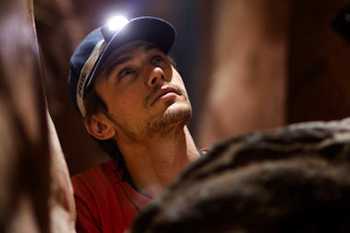 Once again, a Danny Boyle film begins with the simple act of running. This time, it is not one person running, or even anyone running for some sort of purpose. It is just people running. Running because they can. Rushing because they want to.
Once again, a Danny Boyle film begins with the simple act of running. This time, it is not one person running, or even anyone running for some sort of purpose. It is just people running. Running because they can. Rushing because they want to. Why open the movie this way, when the hero isn't even present? It's because understanding the adrenaline rush all humans search for is the only way to make sense of the strange, infuriating, and painful journey the hero of "127 Hours" will endure.
"127 Hours," takes the idea of Realism to an almost unseen level. It is based on the true story of Aron Ralston (James Franco), a mountain climber with a reckless need for adventure. One day, Ralston leaves his comfy Los Angeles apartment for a trip into the American desert, and ends up at the bottom of a canyon with his arm stuck under a rock. And this all happens while he is completely alone.

"127 Hours" is basically a one man show. That doesn't mean there are no other good performances, it just means that Franco's performance is the only one that really matters. Had he failed in his role, "127 Hours" also would've failed. However, Franco is better than that. I've usually found Franco's best performances to be in comedy, but with "127 Hours," he proved he is just as good (if even better) in drama.
What is so perfect about Franco's performance is that it doesn't even feel like he's acting; he's reacting. He does exactly what anyone would actually do if stuck in Aron's situation. What is eventually so haunting and memorable is how much he acts through facial expressions rather than words. It's a rare talent to show such emotions as desperation and intensity without saying anything. Usually, it's the filmmaker, not the actor, who is told to show, not tell. Franco proves that actors should begin to take on this burden as well.
Everyone else who worked on this film is as meticulous in their field as Franco is. Those quick, narrow cuts so perfectly serve the claustrophobia of the location. The cinematography also captures the dramatic American landscape so flawlessly.

Most of all, Boyle has impressed me more and more with each film he makes. Boyle could be accused of being one of the worst offenders of over filmmaking. "127 Hours" randomly contains shots ranging from the inside of a water bottle to the inside of a bone in someone's arm. Usually, these would just be detours in a film. But in "127 Hours," they are the tiny details that truly emphasize this man's incredible quest for survival.
It is funny with all of the over filming how much at times "127 Hours" doesn't even feel like a movie. At times, it doesn't even feel like a pseudo-documentary. It feels just like a slice of reality.

Boyle's most amazing talent is his ability to see that it's not just about what's being filmed, but how it's being filmed. "127 Hours" might have been a preachy, cliche story in another's director's hands. With Boyle, it is a nail-biting adventure, even if the ending is already known. One of the best examples of this is during the rain scene. There is nothing interesting about a rain storm. However, there is a lot interesting about it if you slow it down and turn it into a frightening, unstoppable force of nature.
Boyle also has such a way of connecting with the locations he shoots in, inhabiting them as if he had lived there his whole life. He can connect places with a variety of emotions. The film nails suburban American sprawl in the first five minutes by connecting Los Angeles to various icons of consumerism. He makes this place seem as empty as he made the slums of Mumbai beautiful in "Slumdog Millionare" and the streets of Edinburgh exhilarating in "Trainspotting."
Boyle has always been a highly stylized director, and "127 Hours" is certainly a highly stylized film. Boyle has the rare gift of turning style into substance. Not only does he make such an interesting adventure, he also makes such an interesting character. Aron reminds me of a modern day Christopher McCandless, but with more knowledge of how to survive in nature. Like McCandless, Aron is a people person who doesn't act like one. He seems to only be able to connect to the world by foolishly isolating himself from the people he loves.

This could also be because he defines the McCandless mentality: one has to prove themselves worthy by doing it alone. Maybe it's because men feel they have a special one-on-one connection with nature or they feel nature must be tamed. The lesson Hollywood seems to be teaching us is if you're trying to go on a dangerous trek through nature alone: always leave a note.
In the end, "127 Hours" shows a new Boyle who is more emotionally effected by tragedy. It contains an ending that could've bordered on base sentimentality but is instead truly moving and deserving of a good tear or two. Aron Ralston, despite being selfish and aloof of reality, really deserves a hero's welcome simply for his amazing will to survive and thrive.
One more note before I leave will be of the scene everyone is talking about. If you know the true story or have read the articles, you'll know exactly what I'm talking about. Yes, it's shocking, gruesome, and hard to watch. However, don't let those few very negative reactions of one scene shape your entire opinion of the film. "127 Hours" is a film too big, and too meaningful, to be judged on one scene alone.


No comments:
Post a Comment